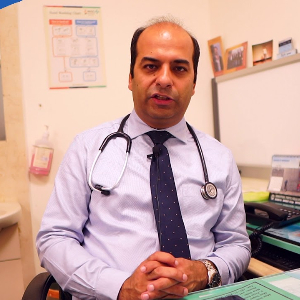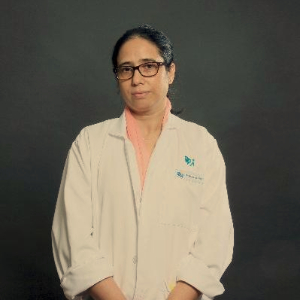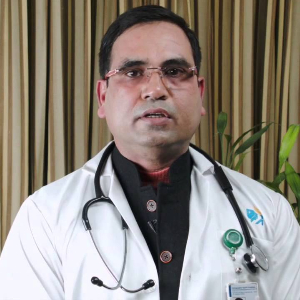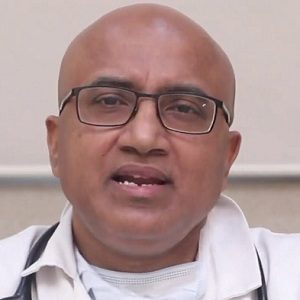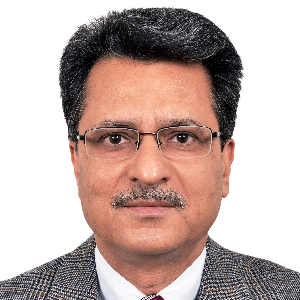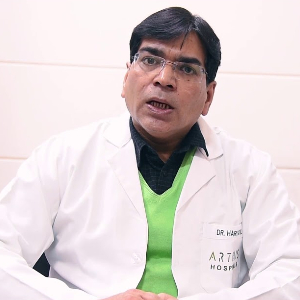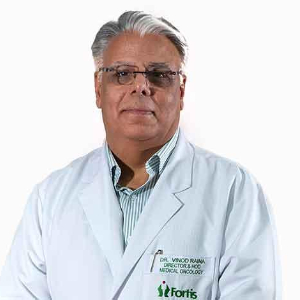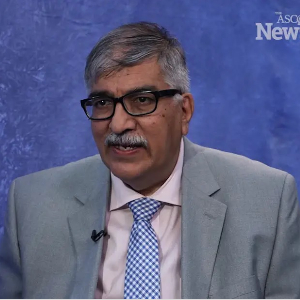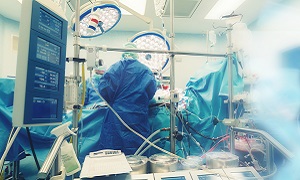Best Doctors in India for Anal Cancer Treatment
- Medical Oncologist, Gurugram, India
- Over 16 years’ experience
Profile Highlights:
- Dr. Ankur Bahl is a reputed medical oncologist in India.
- With over 16 years of experience, Dr. Bahl is considered for his expertise in treating Multiple Myeloma, Lymphoma, Leukemia, Gastrointestinal tumors, Gynaecological Tumors, Head, Neck, and Brain Tumors.
- Surgical Oncologist, New Delhi, India
- Over 20 years’ experience
Profile Highlights:
- One of the finest oncologists in India, Dr. Ruqaya Ahmad Mir has been practicing surgical oncology for the past 20 years and is currently functioning as a Senior Consultant, Oncology at Indraprastha Apollo Hospital, New Delhi.
- Dr. Ruqaya Mir is known for her outstanding performance in some of the advanced surgical techniques which include Uterus and Ovary and Limb Conservation surgery and Cytoreductive surgery and Hyperthermic Intraperitoneal chemotherapy for advanced colorectal and recurrent ovarian malignancies.
- She is also a well trained Robotic Surgeon practicing implementation of minimal invasion in surgical oncology.
- Medical Oncologist, New Delhi, India
- Over 20 years’ experience
Profile Highlights:
- Dr. P K Das is one of the best Oncologists in India with an extensive career as the Senior Consultant Medical Oncologist, the Hemato- Oncologist, and Academic Coordinator of Dept of medical oncology at the Apollo Cancer Institute in New Delhi.
- With many years of experience at the Apollo Hospital, Dr. P K Das has been diligently treating patients and proactively contributing to the medical sector by working alongside topmost doctors in medical oncology.
- Medical Oncologist, New Delhi, India
- Over 15 years experience
Profile Highlights:
- Dr. Dipanjan Panda is one of the well-known medical oncologists in India, having 15 years of expertise in treating bone and soft tissue cancers and gastrointestinal cancers.
- He is credited with starting the country’s first anticancer departments and PDCC program. Dr. Panda developed a medical oncology unit at Indraprastha Apollo Hospital in New Delhi, in association with the Institute of Liver and Biliary Sciences. He is currently working at Indraprastha Apollo Hospital in New Delhi as a Senior Consultant, Medical Oncology.
- Dr. Panda has written twenty peer-reviewed papers in national and international journals. He has presented numerous talks at global forums.
- Medical Oncologist, New Delhi, India
- Over 20 years’ experience
Profile Highlights:
- Dr. Amit Agarwal is a highly successful Medical Oncologist whose primary focus lies on pain management in cancer patients and provides treatment specifically for the management of early stages of Hodgkin’s disease and Non-Hodgkin Lymphoma, Non-Metastatic Ewing’s Sarcoma, Cardiopulmonary Resuscitation, and emergency medications for cancer patients.
- Dr. Agarwal has been part of other prestigious cancer hospitals where he has helped in the treatment of patients with various types and rare cases of cancer.
- Medical Oncologist, Gurugram, India
- Over 30 years’ experience
Profile Highlights:
- Dr. Ashok Kumar Vaid is a reputed Medical Oncologist in India with expertise in the treatment of blood, lungs, skin, breast, and gastrointestinal cancers.
- He is famously known for performing among the first 25 bone marrow transplants in a private hospital in India.
- Dr. Ashok Vaid’s primary area of focus lies in Leukemia, Lymphoma, Solid tumors, and the treatment of organ-specific benign and malignant tumors.
- He prefers to treat his patients using non-surgical and pain-free techniques that include hormone therapy, biological therapy, targeted therapy, and chemotherapy.
- Hematologist and Medical Oncologist, Gurugram, India
- Over 30 years’ experience
Profile Highlights:
- Dr. Hari Goyal is the head of the Oncology unit comprising some of the finest oncologists in the country. The team effort gives an edge & advantage to the patients’ management.
- His contribution to oncology is immense & has developed drugs for the management of chemotherapy side effects. This development has helped millions of cancer patients since 2004.
- Dr. Hari Goyal was a part of a large number of clinical trials of cancer research including one of the FDA audited trials.
- Medical Oncologist, Gurugram, India
- Over 38 years’ experience
Profile Highlights:
- Dr. Vinod Raina is among the top and renowned Medical Oncologists in India with more than 38 years of extensive experience in the field.
- His primary expertise lies in Chemotherapy and is the first to perform high-dose chemotherapy in India. He also performed the first peripheral blood stem cell transplant in India.
- He has performed more than 250 bone marrow transplants and over 70 allotransplants for different types of cancers.
- Medical Oncologist, New Delhi, India
- Over 20 years experience
Profile Highlights:
- Dr. Manish Singhal is a renowned Medical Oncologist from India practicing the best cancer treatment for over 20 years.
- He is a gold medalist doctor who received specialized training in hematopoietic stem cell transplantation from world-renowned BMT specialists.
- Dr. Singhal is specifically interested in gastrointestinal cancer, GU, breast cancer, leukemia, and lung cancer. He excels in all modalities of chemotherapy, immunotherapy, and the management of oncological emergencies, along with patient medical care.
- Director and Head Medical Oncology/Hematology, Gurugram, India
- Over 40 years’ experience
Profile Highlights:
- Dr. Rakesh Chopra is a well-known Medical Oncologist with national and international repute as one of the best in the treatment of all types of blood cancers including leukemia, lymphoma, multiple myeloma, and bone marrow transplant.
- His specialization lies in blood cancer and also provides treatment for solid cancers of the breasts, lungs, prostate, colon, and GI.
Best Hospitals in India for Anal Cancer Treatment
Indraprastha Apollo Hospital, New Delhi
- City: New Delhi, India
Hospital Highlights:
- Indraprastha Apollo Hospital is a 700-bedded multispecialty hospital in the heart of the capital of India. It is a part of Apollo Hospital group, one of India’s most reputed healthcare chains. Indraprastha Apollo Hospital has been accredited by Joint Commission International, making it the first internationally accredited hospital in the country in 2005.
- There are 52 specialties in the hospital with one of the best cardiology centers in the country. The hospital is also equipped with State of the art infrastructure facilities with the largest Sleep Lab in Asia and the largest number of ICU bed facilities in India.
- The hospital also has one of the largest dialysis units in India along with a dedicated Bone Marrow Transplant unit.
- The latest and highly advanced technologies that are installed in the hospital include Da Vinci Robotic Surgery System, PET-MR, PET-CT, Cobalt-based HDR Brachytherapy, Brain Lab Navigation System, Tilting MRI, Portable CT scanner, 3 Tesla MRI, 128 Slice CT scanner, DSA Lab, Endosonography, Hyperbaric Chamber and Fibro scan.
Fortis Memorial Research Institute, Gurugram
- City: Gurugram, India
Hospital Highlights:
- Fortis Memorial Research Institute is a multi-super-specialty, quaternary care hospital with 1000 beds. The hospital comprises reputed clinicians, and international faculty and is also equipped with cutting-edge technology. The hospital is a part of Fortis Healthcare Limited, a reputed chain of private hospitals in India.
- It is a NABH-accredited hospital that is spread across 11 acres of land and has a capacity of 1000 beds. The hospital has 55 specialties and is one of the premier health care centers in the Asia Pacific region popularly known as “the Mecca of Healthcare”.
- The hospital has 260 diagnostic centers and is also equipped with the latest and advanced techniques that include 3 Telsa which is the world’s first Digital MRI technology. The hospital also has world-class Radiation Therapy techniques which have been developed by leading technology experts from Elekta and Brain Lab.
Apollo Hospital, Chennai
- City: Chennai, India
Hospital Highlights:
- Apollo Hospitals, Chennai, is one of the best hospitals for heart care in India. Over the years, Apollo has expanded all over India, as a healthcare chain.
- India’s first ‘Only Pancreas’ transplant was performed in Apollo Hospital. The hospital is known for successfully performing Asia’s first en-bloc combined heart and liver transplant, and over the years, it has attained a remarkable achievement in the global healthcare space. Around 3-4 organ transplants are performed in the hospital per day.
- Equipped with over 500 beds, this hospital in Chennai was established in 1983 and since then has been among the most preferred hospital for patients from all over the world.
- The hospital holds accreditation of the NABH and JCI and is the first hospital in India to be ISO 9001 and ISO 14001 certified. It is also the first South Indian Hospital to receive subsequent reaccreditation from the JCI USA 4 times.
Medanta-The Medicity, Gurgaon
- City: Gurugram, India
Hospital Highlights:
- One of India’s best and largest multi-specialty hospitals, Medanta was built with the aim to bring India to the highest standards of medical care. The hospital has been providing the best medical services to its patients, since its inception, with care, commitment, and compassion.
- Equipped with 1250 beds, the hospital was founded by Dr. Naresh Trehan in the year 2009 with an aim to provide the best medical care at affordable costs. The hospital is spread across 43 acres and includes 45 operation theatres and 350 beds dedicated solely to ICU. The hospital includes over 800 doctors, and more than 22 specialty departments and has a dedicated floor for individual specialty in order to offer the best services under one roof.
- The hospital is considered one of the premier institutes in India for Cardiac Care and includes staffs and members of high caliber. The hospital has 6 distinct centers of excellence.
Max Super Specialty Hospital, New Delhi
- City: New Delhi, India
Hospital Highlights:
- One of the well-regarded providers in India committed to the highest standards of clinical excellence and patient care, Max Super Specialty Hospital is a part of Max Healthcare, which is the second-largest healthcare chain in India. Regarded as one of the most well-regarded healthcare providers in the country, Max Super Specialty Hospital is committed to the highest standards of clinical excellence as well as patient care. The hospital is also equipped with the latest technology as well as cutting-edge research. The hospital is known to deliver and ensure the highest level of patient care.
- The hospital has more than 500 beds and offers treatment for over 35 specialties. The hospital also holds the credit of having installed the first Brain Suite in Asia. This is a highly advanced Neurosurgical machine that allows MRI to be taken while surgery is ongoing.
- Other advanced and latest technologies are also installed in the hospital such as the 1.5 Tesla MRI machine, 64 Slice CT Angiography, 4D ECHO, LINAC, and 3.5T MRI machine.
Artemis Hospital, Gurugram
- City: Gurugram, India
Hospital Highlights:
- One of the most well-known hospitals in the Delhi NCR, Artemis Hospital is the first hospital in Gurugram to get accredited by the Joint Commission International.
- With more than 40 specialties, the hospital has been designed to be one of the most technically advanced hospitals in the country, with the best medical and surgical health care. The hospital has eleven special and dedicated centers, for Heart, Cancer, Neurosciences, etc.
- The latest technologies in the hospital include Endovascular Hybrid Operating Suite and Flat panel Cath Labs for the cardiovascular department, 3 Tesla MRI, 16 slice PET CT, 64 Slice Cardiac CT Scan, HDR Brachytherapy, and highly advanced Image Guided Radiation Therapy techniques (LINAC) are installed in the hospital.
- The hospital has won several awards as well, since its inception.
BLK Max Super Specialty Hospital, New Delhi
- City: New Delhi, India
Hospital Highlights:
- Equipped with 650 beds, BLK Superspecialty Hospital is the largest stand-alone private sector hospital in Delhi.
- With over 1500 healthcare providers and 150 globally renowned super specialists, the hospital is one of Asia’s largest Bone Marrow Transplant Centres. The hospital is known for having some of the best cancer doctors in the country.
- The hospital is NABH and NABL accredited and was inaugurated by the first Prime Minister of India. Pt. Jawahar Lal Nehru.
Gleneagles Global Hospitals, Chennai
- City: Chennai, India
Hospital Highlights:
- Established in 1999, Gleneagles Global Hospital, Chennai, is one of the top healthcare facilities in Southern India. It is part of the Gleneagles Hospital Chain, which is the fourth largest healthcare chain in the country. The hospital specializes in multi-organ transplants of kidneys, liver, lungs, heart, etc.
- The hospital has an excellent infrastructure and state-of-the-art lab and equipment set-up. The hospital boasts cutting-edge technologies, a highly skilled team of doctors and surgeons, and trained support staff. Located in Perumbakam, Chennai, it is one of India’s premier health care destinations. The hospital has performed some of the most complex surgical and clinical procedures in India including multi-organ transplantations.
- The hospital’s lung transplantation program is one of the best in the country. The hospital is known for having performed India’s first single lung transplant and first minimal invasive lung transplant. It is also the only Indian hospital to be associated with King’s College Hospital, London, United Kingdom for liver transplantations.
Fortis Hospital, Mulund, Mumbai
- City: Mumbai, India
Hospital Highlights:
- Fortis Hospital in Mulund is a 315-bed multi-speciality tertiary care hospital with five JCI accreditations that offers a wide variety of diagnostic and therapeutic services. The Fortis Hospital in Mulund delivers patient-centred treatment with cutting-edge technology, highly skilled and experienced surgeons, and paramedical staff.
- This institution houses Maharashtra’s largest multi-organ transplant centre. It is also the first heart transplant centre in western India to conduct 100 or more consecutive heart transplants in under four years. It is the only hospital in the city to have multi-organ transplants and has handled the youngest patient for angioplasty. Fortis Hospital Mulund now boasts the first advanced surgical robot in central Mumbai.
- Cardiology and heart surgery, urology, nephrology, neurosciences, orthopaedics, digestive care, emergency and critical care, and maternity care are among the services provided by the hospital.
Kokilaben Dhirubhai Ambani Hospital, Mumbai
- City: Mumbai, India
Hospital Highlights:
- Kokilaben Dhirubhai Ambani Hospital, Named after the wife of Indian industrialist Dhirubhai Ambani, the founder of Reliance Industries, this is one of the top hospitals in Mumbai. This 750-bed multi-specialty hospital became operational in 2009. Known as one of India’s most advanced tertiary care facilities, the hospital is designed to raise India’s global standing as a healthcare hub, with an emphasis on excellence in clinical services.
- Kokilaben Dhirubhai Ambani Hospital uses Protocol and Care Pathway based treatment models to ensure the best outcomes for patients.
- The hospital represents a confluence of top-notch talent, cutting-edge technology, state-of-the-art infrastructure, and, most importantly commitment.
- The hospital also holds the accreditation of the NABH, NABL, CAP, and JCI.
- The hospital has been recognized as the No. 1 Multispecialty Hospital in Mumbai and the West Zone for the fifth year in a row in 2020 by The Week.
ANAL CANCER
Anal cancer occurs when cancer cells form tumors in the tissues of the anus. The anus is the small opening located at the lower end of the intestines. This condition causes signs and symptoms such as anal pain and rectal bleeding.
It is an uncommon form of cancer occurring in the anal canal. This canal is a short tube at the rectum end that allows stools to leave your body.
Generally, anal cancer is rare, but when it occurs, it can spread to other parts of the body. If you develop any of the signs and symptoms of this condition, then it is best to see your doctor immediately.
Symptoms
Symptoms of anal cancer can be similar to those of hemorrhoids, gastrointestinal diseases, and irritable bowel syndrome.
These include:
- Changes in bowel habits
- Thin Stools
- Discharge from the anus or itching
- Bleeding from the Rectum
- Pain, Pressure, or the Formation of a lump near the anus
- A growth or mass in the anal canal
- Anal itching
If you experience any of these symptoms and aren’t sure of the cause, then it is best to go to your doctor for evaluation. They will be able to do certain tests to diagnose if these symptoms belong to anal cancer.
Causes & risk factors
Anal Cancer generally develops when due to a genetic mutation, normal and healthy cells turn into abnormal cells. Healthy cells grow and multiply at a set rate, eventually dying at a set time. Abnormal cells grow and multiply out of control, and they don’t die either. Thus, these accumulating abnormal cells form a mass or a tumor. Cancer cells invade nearby tissues and may separate from an initial tumor and spread elsewhere in the body.
Anal cancer is also related to a sexually transmitted infection known as human papillomavirus or the HPV virus. This HPV virus is detected in the majority of anal cancers and is therefore considered to be the most common cause of anal cancers.
Several factors are known to increase the risk of anal cancer. Some of these include:
- Older age- Most cases of anal cancer are generally seen in people aged 50 or older.
- Having many sexual partners- People who have many sexual partners over their lifetime generally have a greater risk of this condition.
- Anal sex- People who engage in receptive anal sex also have an increased risk of anal cancer.
- Human papillomavirus (HPV)- The HPV infection can increase your risk of several cancers, which also include anal cancer. HPV infection is a sexually transmitted infection which might cause genital warts as well.
- Smoking- Smoking cigarettes also increase the risk of anal cancer.
- Having a history of cancer- Those who have had cervical, vulvar or vaginal cancer are at an increased risk of anal cancer.
- Immunosuppressive drugs- Some people take drugs to suppress their immune systems. This includes people who have received organ transplants. They may have an increased risk of anal cancer. The HIV virus also suppresses the immune system and can increase the risk of anal cancer.
Diagnosis
People who are at high risk for anal cancer can be diagnosed by screening tests, such as the digital rectal exam or anal Pap test. A doctor might also find anal cancer during a routine physical exam or during a minor. Treating cancers that are found in this way is very effective since the tumors are found early.
Generally, a doctor first asks about your medical history if you have any symptoms of anal cancer. Your doctor will also examine you to look for signs of anal cancer, as well as other health problems. If any problems are found, your doctor is going to require a few other exams or tests to find the cause of cancer. A few more tests can be required, which include the following:
Digital rectal exam
Anoscopy
For anoscopy, a doctor uses a short, hollow, firm tube called an anoscope, which may have a light on the end of it. The anoscope is coated with a gel and then gently it is gently pushed into the anus and the lower rectum.
The doctor is able to have a clear view of the lining of the lower rectum and anus. Samples from abnormal areas can be taken at the same time, to be tested in the lab. During this test, you will be conscious but it doesn’t usually hurt.
Rigid proctosigmoidoscopy
Endoscopy
Biopsy

If a change or abnormal growth is detected during an endoscopic exam, then your doctor is going to need to take out a piece of it so that it can be determined in the lab if it’s cancerous. This is called a biopsy. If the growth is in the anal canal, it may be through the scope itself. Sedative drugs may be used to numb the area before the biopsy is taken. If the tumor is too small, your doctor might try to remove the entire tumor during the biopsy.
Blood tests
If you have risk factors for HIV, your doctor is likely going to order a blood test to check for it. This information is important since HIV positive patients require treatment for HIV so that their immune system is healthy again before they undergo cancer treatment.
Ultrasound
Ultrasound uses sound waves for creating images of the internal organs or masses. This can help to see how deep cancer has grown into the tissues near the anus. Although for most ultrasound exams, a transducer is moved around on the skin, for anal cancer, the transducer is put into the rectum. Although the test can be uncomfortable, it generally doesn’t hurt.
Computed tomography (CT) scan
Magnetic resonance imaging (MRI)
MRI scans use radio waves along with strong magnets. Contrast material may be injected into a vein before the scan to see details better.
This test is also used to see if nearby lymph nodes are enlarged, which is an indication that cancer has spread there. MRI can also be used to look at abnormal areas in the liver or the brain and spinal cord that could be cancer spread.
Chest x-ray
Positron emission tomography (PET) scan
Treatment
The treatment you receive for anal cancer generally depends on several factors, which include your overall health, the stage of your cancer, as well as your own preferences.
In most cases, anal cancers are treated with a combination of chemotherapy and radiation. Together these two treatments can enhance the chances of having a cure.
Chemotherapy
In Chemotherapy method, drugs are injected into a vein, or taken as pills. These chemicals travel throughout the body and rapidly kill growing cells, including the cancer cells. However, they also cause damage to some of the healthy cells, and this can cause certain side effects, like vomiting, nausea, and hair loss.
Radiation therapy
Radiation therapy involves using high-powered beams like X-rays and protons, to kill the cancer cells. During the procedure, you are positioned on a table, and a large machine moves over you and directs the radiation beams to specific areas of your body to target cancer.
However, it is to be noted that radiation can also damage any health tissue near where the beams are aimed. Side effects can include skin redness and sores in and around the anus, as well as hardening and shrinking of your anal canal.
For anal cancer, radiation therapy is generally required for five to six weeks.
Though the combination of chemotherapy and radiation makes the treatments more effective, side effects become more likely. You can talk to your doctor regarding the side effects you can expect.
Depending on the stage of your cancer, your doctor might also recommend surgery.
Surgery for removal of early-stage anal cancers
Small anal cancers can be removed through surgery. During the procedure, the surgeon will remove the tumor and a small amount of healthy tissue surrounding it.
Since the tumors are small, early-stage cancers can sometimes be removed without causing any damage to the anal sphincter muscles surrounding the anal canal.
Depending on your cancer, your doctor may also recommend chemotherapy and radiation after surgery.
Surgery for cancer that hasn't responded to any other treatments
If your cancer is not responding to chemotherapy and radiation, your doctor might recommend a more extensive operation which is known as abdominoperineal resection, also called AP resection. During this method, the surgeon will remove the anal canal, rectum along a portion of the colon. The surgeon then attaches the remaining portion of your colon to an opening or stoma in your abdomen through which waste is able to leave the body and collect in a colostomy bag.
Immunotherapy
Palliative care
Alternative Medicine
This treatment cannot cure cancer but help the patients cope with any side effects of cancer. This type of treatment provides additional comfort and complements your current treatment from the doctor.
- Nausea: Hypnosis, acupuncture, music therapy
- Anxiety: massage, hypnosis, exercise, meditation, relaxation technique, music therapy
- Sleep problems: Relaxation technique or yoga
- Fatigue: Tai chi or gentle exercise
- Pain: Massage, hypnosis, acupuncture, music therapy
Coping and support
- Ask your doctor about the details of anal cancer which include its staging, type, prognosis, and treatment.
- Stay in close contact with your friends or family who will take care of you and support you.
- Find someone whom you can talk to whether a family member or a friend. You may also take the help of a support group and be a part of any of those communities.
Complications
Prevention
Although there is no way of preventing anal cancer, you can reduce the risk of the same.
- Getting vaccination for HPV: Vaccines are available that you can take to protect yourself from HPV infection. Whether you are an adult or a teenager and a boy or a girl, you can get the vaccine.
- Quit smoking: If you are having the habit of smoking, you must quit the same immediately as smoking can increase your risk of developing anal cancer.
- Practicing safer sex: It helps to prevent both types of sexually transmitted viruses- HIV and HPV that increase your risk of developing anal cancer.

